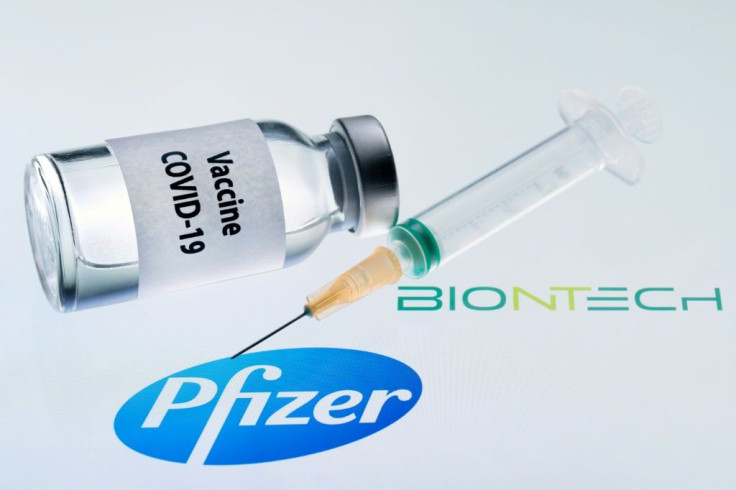Moderna Or Pfizer? Which Company Stands To Gain The Most From Vaccine Rollout
Moderna and Pfizer made history when they brought their coronavirus vaccines from development to market in less than a year. So far, though, Moderna has been the only one to benefit from a share-price perspective. The company's shares soared more than 600% this year. Pfizer's stock is little changed.
Why such a difference? Investors knew that an eventual vaccine would be Moderna's first marketed product, and therefore, its source of product revenue. Conversely, Pfizer's future didn't depend on the vaccine program. That's because the big pharmaceutical company generates revenue from a vast array of products.
Now we've entered a new phase. Moderna and Pfizer launched their vaccines this month under emergency authorizations. Let's take a look at which company may win when it comes to revenue -- and share performance.
U.K., U.S., and European authorizations
Pfizer and partner BioNTech won authorization in the U.K., then the U.S., and most recently in the European Union. The pharmaceutical company has orders for at least 550 million doses from various countries and regions including the U.S., the European Union, the U.K, and others. The number doesn't include Canada, which ordered doses but didn't announce how many.
Pfizer hasn't released how much it's charging, but we can use the price the U.S. paid as a guide. That's $1.95 billion for 100 million doses, or $19.50 per dose. For the doses ordered so far, that equals more than $10 billion. Pfizer also must share some of its gains with BioNTech.

Let's have a look at Moderna. The U.S. Food and Drug Administration (FDA) granted Moderna's vaccine Emergency Use Authorization last week. The biotech has secured orders for more than 470 million doses from the U.S., the European Union, Canada, Switzerland, and other countries. Like my Pfizer count, this doesn't include countries that haven't announced quantities ordered. In this case, that means Singapore and Qatar.
We'll use the price the U.S. paid again to give us a ballpark revenue estimate, and that's $1.5 billion for $100 million doses -- or $15 a dose. That means more than $7 billion in revenue from the doses ordered so far. A point to keep in mind is that Moderna has priced smaller orders at $32 to $37 a dose, so that could bring revenue even higher.
There are a few other points to consider. First, it's clear that the companies won't generate those levels of revenue overnight. Moderna aims to make as many as 125 million doses available in the first quarter. So in the near term, revenue may be just under $2 billion.
Pfizer said it can supply as many as 50 million doses this year and 1.3 billion doses by the end of next year. So it may generate about $975 million by the end of this year.
Blockbuster levels
Still, both Moderna and Pfizer stand to quickly reach the blockbuster level of $1 billion in sales from their coronavirus vaccines. And that's significant.
From a revenue perspective, without considering other factors, the companies may be on par. But a logistics factor also is part of the picture. I'm referring to transport and storage. In this area, Moderna scores more points.
Moderna's vaccine can be transported and stored at standard refrigerator temperatures. It even can be left at room temperature for up to 12 hours. Pfizer's requires ultra-low temperatures, so countries and healthcare systems that want to provide Pfizer's vaccine must invest in special freezers.
Costs of freezers range from $5,000 to $15,000. That increases the overall budget for vaccination considerably. And Stat News reports that Pfizer's minimum-order requirement is higher than Moderna's -- 975 doses versus 100 doses. The temperature and minimum-order factors are likely to make it difficult -- or impossible -- for many small healthcare settings to consider the Pfizer vaccine.
What does this mean for the companies and their investors?
In the first few weeks of vaccine rollout, the world needs all the vaccine it can get. As you can see from the numbers above, both companies don't immediately have the production capacity to fulfill all orders. Even if Pfizer's vaccine represents logistical challenges, countries and healthcare settings will do their best to adjust.
But once initial orders are filled and both companies reach full production, Moderna is likely to emerge as a leader. Transport and storage requirements mean Pfizer's vaccine will cost countries a lot more than just the price for doses. Governments will take that into account when they decide to place their next orders.
As for share price, Moderna also has the most to gain. Investors will closely watch revenue from this first and only product in the coming quarters. If it meets or beats expectations, shares of this biotech company may be on their way to another winning year.
This article originally appeared in the Motley Fool. The Motley Fool has a disclosure policy.



















